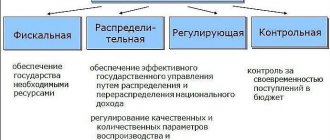Having a wide range of rights and powers, tax authorities often abuse their power. Cases of repeated accrual and collection of debts, incorrect calculation of fines and penalties, unauthorized seizure of documents and even outright extortion have long become everyday Russian practice. To avoid such violations, taxpayers must be well aware of the powers that tax inspectors have and not allow them to abuse their power. How to do this will be discussed further.
Main powers of tax authorities
The rights of the tax authorities of the Russian Federation are enshrined in Article 31 of the Tax Code. Now this article is in force as amended by Federal Law No. 137 of July 27, 2006. The first part of the article establishes 15 main powers of tax authorities:
- Collect documents from taxpayers for the calculation and payment of fees.
- Check the activities of firms and companies regarding the calculation and payment of taxes (in particular, control banking organizations).
- Seize taxpayer documents during inspections if there is suspicion of falsification of papers or other fraud.
- Call payers to the tax office to provide explanations on taxes paid.
- Seize property and accounts, suspend operations on them.
- Inspect any property of the taxpayer that helps him benefit.
- Calculate the amount of taxes to be paid independently.
- Demand that any irregularities in payment be corrected.
- To fine, collect arrears and penalties.
- Demand from banks documents confirming the payment of taxes by any payers.
- Involve third-party experts, specialists and translators in your work.
- Call any witnesses whose testimony may help with the calculation and payment of taxes.
- To petition for the revocation and annulment of the debtors’ business licenses.
- File claims in courts of various instances to collect penalties, fines, compensation for damage to the state from debtors, termination of investment loan agreements, etc.
- Repeatedly demand payment of fines, penalties and arrears that were previously recognized as uncollectible, i.e. not subject to collection.
The Code separately stipulates that tax authorities have the right to carry out any other actions if they do not contradict the text of the document. In addition, these powers are exercised in relation to payers of not only taxes, but also insurance premiums.
Rights and obligations of the tax authorities of the Russian Federation
Articles 31 and 32 of the Tax Code of the Russian Federation establish the general rights and obligations of tax authorities. The relationship between the normative categories of “rights”, “powers” and “obligations” of tax authorities gives rise to a reasonable discussion of a general theoretical nature. There are the following opinions on this issue: 1) powers are the rights of tax authorities; 2) powers are responsibilities; 3) rights, duties and powers – concepts that are identical to each other; 4) powers are a collective category that includes the totality of the rights and obligations of tax authorities.
The distinction between “rights” and “responsibilities” in relation to tax authorities is very conditional due to the fact that the implementation of the rights granted to them is a functional purpose. Tax authorities do not have the right, at their discretion, to refuse to exercise their rights. What they have the right to do (for example, conduct tax audits or collect arrears), they are obliged to do, and vice versa[1].
Rights and obligations here merge together, forming a kind of “alloy” of rights and obligations, often referred to in the literature as “state powers”. It is no coincidence Art. 33 of the Tax Code of the Russian Federation establishes that officials of tax authorities are obliged to implement, within the limits of their competence, the rights and obligations of tax authorities.
However, differences in the legal nature of the rights and obligations of tax authorities still exist. According to Art. 22 of the Tax Code of the Russian Federation, the rights of taxpayers are ensured by the corresponding duties of tax authorities. Thus, the responsibilities of tax authorities are always in one way or another connected with ensuring the rights of taxpayers, whether we are talking about exercising tax control, returning overpaid taxes, maintaining tax secrecy or other actions. The responsibilities of tax authorities seem to conflict with the rights of taxpayers. The rights of tax authorities have an independent meaning in this context; they correspond to the responsibilities (and not the rights) of taxpayers. There is a classic construction of a legal relationship, where the subjective right of one participant corresponds to the legal obligation of another.
To the general rights of tax authorities Art. 31 of the Tax Code of the Russian Federation includes the following:
1) demand from the taxpayer or tax agent documents serving as the basis for the calculation and payment (withholding and transfer) of taxes, as well as explanations and documents confirming the correctness of calculation and timely payment (withholding and transfer) of taxes. When conducting tax audits, tax authorities have the right to request additional information, receive explanations and documents confirming the correctness of calculation and timely payment of taxes (Clause 4 of Article 88, Article 93 of the Tax Code of the Russian Federation);
2) conduct tax audits;
3) seize documents indicating the commission of tax offenses when there are reasonable grounds to believe that these documents will be destroyed, hidden, altered or replaced;
4) to summon taxpayers or tax agents to give explanations to the tax authorities on the basis of a written notification;
5) suspend transactions on the accounts of taxpayers and tax agents in banks and seize their property;
6) inspect (examine) any production, warehouse, trading and other premises and territories used by the taxpayer to generate income or related to the maintenance of taxable objects, regardless of their location, and conduct an inventory of property owned by the taxpayer;
7) determine the amount of taxes by calculation based on available information about the taxpayer, as well as data about other similar taxpayers. This right can be exercised in the following cases: a) the taxpayer refuses to allow officials to inspect (inspect) production, warehouse, retail and other premises and territories used to generate income or related to the maintenance of taxable objects; b) failure to provide the tax authority with the documents necessary for calculating taxes for more than two months; c) lack of accounting for income and expenses, accounting for taxable items; d) keeping records in violation of the established procedure, resulting in the impossibility of calculating taxes;
demand from taxpayers, tax agents, and their representatives to eliminate identified violations of tax legislation;
9) collect arrears, penalties and fines;
10) control the compliance of large expenses of individuals with their income;
11) demand from banks documents confirming the execution of payment orders of taxpayers and tax agents and collection orders (orders) of tax authorities to write off taxes, penalties and fines from the accounts of taxpayers and tax agents;
12) attract specialists, experts and translators to conduct tax control;
13) call as witnesses persons who may be aware of any circumstances relevant to the conduct of tax control;
14) submit petitions for cancellation or suspension of licenses issued to legal entities and individuals for the right to carry out certain types of activities;
15) create tax posts[1].
To protect the fiscal interests of the state, tax authorities are given the right to participate in litigation proceedings and bring claims to the courts: a) for the collection of tax sanctions; b) on invalidating the state registration of a legal entity or individual entrepreneur; c) on the liquidation of the organization; d) on early termination of the tax credit agreement and the investment tax credit agreement; e) on the collection of arrears for more than three months or for organizations that are dependent (subsidiaries) from the main (predominant, participating) organizations, when the latter’s bank accounts receive proceeds for goods sold (work, services) of dependent (subsidiary) organizations , or vice versa - for organizations that are the main ones, from dependent (subsidiary) organizations, when their bank accounts receive revenue for the goods (work, services) sold by the main organizations.
According to Art. 32 of the Tax Code of the Russian Federation, tax authorities are obliged to:
1) comply with tax laws;
2) exercise tax control;
3) keep records of organizations and individuals;
4) inform free of charge (including in writing) taxpayers about current taxes and fees, tax legislation and regulations adopted in accordance with it, the procedure for calculating and paying taxes and fees, the rights and obligations of taxpayers, the powers of tax authorities and their officials persons, as well as provide tax reporting forms and explain the procedure for filling them out;
5) refund or offset overpaid or overcharged amounts of taxes, penalties and fines;
6) maintain tax secrecy;
7) send to the taxpayer or tax agent copies of the tax audit report and the decision of the tax authority, as well as in cases provided for by the Tax Code of the Russian Federation, a tax notice and a requirement to pay taxes and fees.
Tax officials are obliged to:
1) act in strict accordance with the Tax Code of the Russian Federation and other federal laws;
2) implement, within their competence, the rights and obligations of tax authorities;
3) treat taxpayers, their representatives and other participants in tax legal relations correctly and carefully, and not humiliate their honor and dignity (Article 33 of the Tax Code of the Russian Federation)[1].
The tax authorities are fully subject to the principle of legality. According to paragraph 3 of Art. 30 of the Tax Code of the Russian Federation, they act within the limits of their competence and in accordance with current legislation. Tax authorities are responsible for losses caused to taxpayers as a result of their unlawful actions (decisions) or inaction, as well as unlawful actions (decisions) or inaction of officials and other employees in the performance of their official duties. Under losses in accordance with clause 2 of Art. 15 of the Civil Code of the Russian Federation refers to expenses that a person whose right has been violated has made or will have to make to restore the violated right, loss or damage to his property (real damage), as well as lost income that this person would have received under normal conditions of civil circulation, if if his right were not violated (lost profits)[2].
Losses caused to taxpayers are reimbursed from the federal budget in the manner prescribed by the Tax Code of the Russian Federation and other federal laws (Clause 1, Article 35 of the Tax Code of the Russian Federation). In this case, tax legislation specifies, in relation to tax legal relations, the norm enshrined in Art. 53 of the Constitution of the Russian Federation: “Everyone has the right to compensation by the state for damage caused by illegal actions (or inaction) of public authorities or their officials.”
Unfortunately, it is incredibly difficult to prove the presence, size and cause-and-effect relationship of losses caused to unlawful acts of officials. The procedure for compensation for losses is regulated by civil law. Since, as noted above, tax authorities are representatives of the state in tax legal relations, the real defendant in this case is the state. It is no coincidence that losses caused to taxpayers are compensated from the federal budget (Clause 1, Article 35 of the Tax Code of the Russian Federation).
Articles 31 and 32 of the Tax Code of the Russian Federation establish the general rights and obligations of tax authorities. The relationship between the normative categories of “rights”, “powers” and “obligations” of tax authorities gives rise to a reasonable discussion of a general theoretical nature. There are the following opinions on this issue: 1) powers are the rights of tax authorities; 2) powers are responsibilities; 3) rights, duties and powers – concepts that are identical to each other; 4) powers are a collective category that includes the totality of the rights and obligations of tax authorities.
The distinction between “rights” and “responsibilities” in relation to tax authorities is very conditional due to the fact that the implementation of the rights granted to them is a functional purpose. Tax authorities do not have the right, at their discretion, to refuse to exercise their rights. What they have the right to do (for example, conduct tax audits or collect arrears), they are obliged to do, and vice versa[1].
Rights and obligations here merge together, forming a kind of “alloy” of rights and obligations, often referred to in the literature as “state powers”. It is no coincidence Art. 33 of the Tax Code of the Russian Federation establishes that officials of tax authorities are obliged to implement, within the limits of their competence, the rights and obligations of tax authorities.
However, differences in the legal nature of the rights and obligations of tax authorities still exist. According to Art. 22 of the Tax Code of the Russian Federation, the rights of taxpayers are ensured by the corresponding duties of tax authorities. Thus, the responsibilities of tax authorities are always in one way or another connected with ensuring the rights of taxpayers, whether we are talking about exercising tax control, returning overpaid taxes, maintaining tax secrecy or other actions. The responsibilities of tax authorities seem to conflict with the rights of taxpayers. The rights of tax authorities have an independent meaning in this context; they correspond to the responsibilities (and not the rights) of taxpayers. There is a classic construction of a legal relationship, where the subjective right of one participant corresponds to the legal obligation of another.
To the general rights of tax authorities Art. 31 of the Tax Code of the Russian Federation includes the following:
1) demand from the taxpayer or tax agent documents serving as the basis for the calculation and payment (withholding and transfer) of taxes, as well as explanations and documents confirming the correctness of calculation and timely payment (withholding and transfer) of taxes. When conducting tax audits, tax authorities have the right to request additional information, receive explanations and documents confirming the correctness of calculation and timely payment of taxes (Clause 4 of Article 88, Article 93 of the Tax Code of the Russian Federation);
2) conduct tax audits;
3) seize documents indicating the commission of tax offenses when there are reasonable grounds to believe that these documents will be destroyed, hidden, altered or replaced;
4) to summon taxpayers or tax agents to give explanations to the tax authorities on the basis of a written notification;
5) suspend transactions on the accounts of taxpayers and tax agents in banks and seize their property;
6) inspect (examine) any production, warehouse, trading and other premises and territories used by the taxpayer to generate income or related to the maintenance of taxable objects, regardless of their location, and conduct an inventory of property owned by the taxpayer;
7) determine the amount of taxes by calculation based on available information about the taxpayer, as well as data about other similar taxpayers. This right can be exercised in the following cases: a) the taxpayer refuses to allow officials to inspect (inspect) production, warehouse, retail and other premises and territories used to generate income or related to the maintenance of taxable objects; b) failure to provide the tax authority with the documents necessary for calculating taxes for more than two months; c) lack of accounting for income and expenses, accounting for taxable items; d) keeping records in violation of the established procedure, resulting in the impossibility of calculating taxes;
demand from taxpayers, tax agents, and their representatives to eliminate identified violations of tax legislation;
9) collect arrears, penalties and fines;
10) control the compliance of large expenses of individuals with their income;
11) demand from banks documents confirming the execution of payment orders of taxpayers and tax agents and collection orders (orders) of tax authorities to write off taxes, penalties and fines from the accounts of taxpayers and tax agents;
12) attract specialists, experts and translators to conduct tax control;
13) call as witnesses persons who may be aware of any circumstances relevant to the conduct of tax control;
14) submit petitions for cancellation or suspension of licenses issued to legal entities and individuals for the right to carry out certain types of activities;
15) create tax posts[1].
To protect the fiscal interests of the state, tax authorities are given the right to participate in litigation proceedings and bring claims to the courts: a) for the collection of tax sanctions; b) on invalidating the state registration of a legal entity or individual entrepreneur; c) on the liquidation of the organization; d) on early termination of the tax credit agreement and the investment tax credit agreement; e) on the collection of arrears for more than three months or for organizations that are dependent (subsidiaries) from the main (predominant, participating) organizations, when the latter’s bank accounts receive proceeds for goods sold (work, services) of dependent (subsidiary) organizations , or vice versa - for organizations that are the main ones, from dependent (subsidiary) organizations, when their bank accounts receive revenue for the goods (work, services) sold by the main organizations.
According to Art. 32 of the Tax Code of the Russian Federation, tax authorities are obliged to:
1) comply with tax laws;
2) exercise tax control;
3) keep records of organizations and individuals;
4) inform free of charge (including in writing) taxpayers about current taxes and fees, tax legislation and regulations adopted in accordance with it, the procedure for calculating and paying taxes and fees, the rights and obligations of taxpayers, the powers of tax authorities and their officials persons, as well as provide tax reporting forms and explain the procedure for filling them out;
5) refund or offset overpaid or overcharged amounts of taxes, penalties and fines;
6) maintain tax secrecy;
7) send to the taxpayer or tax agent copies of the tax audit report and the decision of the tax authority, as well as in cases provided for by the Tax Code of the Russian Federation, a tax notice and a requirement to pay taxes and fees.
Tax officials are obliged to:
1) act in strict accordance with the Tax Code of the Russian Federation and other federal laws;
2) implement, within their competence, the rights and obligations of tax authorities;
3) treat taxpayers, their representatives and other participants in tax legal relations correctly and carefully, and not humiliate their honor and dignity (Article 33 of the Tax Code of the Russian Federation)[1].
The tax authorities are fully subject to the principle of legality. According to paragraph 3 of Art. 30 of the Tax Code of the Russian Federation, they act within the limits of their competence and in accordance with current legislation. Tax authorities are responsible for losses caused to taxpayers as a result of their unlawful actions (decisions) or inaction, as well as unlawful actions (decisions) or inaction of officials and other employees in the performance of their official duties. Under losses in accordance with clause 2 of Art. 15 of the Civil Code of the Russian Federation refers to expenses that a person whose right has been violated has made or will have to make to restore the violated right, loss or damage to his property (real damage), as well as lost income that this person would have received under normal conditions of civil circulation, if if his right were not violated (lost profits)[2].
Losses caused to taxpayers are reimbursed from the federal budget in the manner prescribed by the Tax Code of the Russian Federation and other federal laws (Clause 1, Article 35 of the Tax Code of the Russian Federation). In this case, tax legislation specifies, in relation to tax legal relations, the norm enshrined in Art. 53 of the Constitution of the Russian Federation: “Everyone has the right to compensation by the state for damage caused by illegal actions (or inaction) of public authorities or their officials.”
Unfortunately, it is incredibly difficult to prove the presence, size and cause-and-effect relationship of losses caused to unlawful acts of officials. The procedure for compensation for losses is regulated by civil law. Since, as noted above, tax authorities are representatives of the state in tax legal relations, the real defendant in this case is the state. It is no coincidence that losses caused to taxpayers are compensated from the federal budget (Clause 1, Article 35 of the Tax Code of the Russian Federation).
Types of tax control
In accordance with Russian legislation, tax authorities have the right to control taxpayers at all stages of their activities. Depending on the time and reasons for conducting it, there are three types of control:
- preliminary (aimed at preventing tax violations);
- operational (designed to stop violations at the stage of current economic activity of the enterprise);
- follow-up (helps identify violations after the fact based on final reports).
At each stage of control, tax authorities can carry out complex and thematic activities, complete and selective seizures of documents, desk and field audits, scheduled and unannounced inspections with the involvement of third-party experts, inventory of property and other activities described in the Tax Code.
Types of tax audits
Of course, tax audits are the most common activity of tax inspectors. Their work is based on field and office events. What is the difference between these types of checks?
Desk tax audits
This is a common form of tax audits for current control. The sequence of actions during desk inspections is regulated by Article 88 of the Tax Code of the Russian Federation. As part of such activities, tax authorities can perform the following actions:
- check declarations, reports and other documents submitted by the taxpayer for errors and inconsistencies;
- establish to what extent the information from these documents corresponds to the information available to the tax authority itself;
- control the correctness of the calculation of the tax base and other arithmetic calculations;
- allow or deny requested tax deductions and benefits.
That is, the main task of a desk audit is to monitor the current activities of the taxpayer based on the documents submitted by him. This type of control does not imply tax inspectors visiting the site, inspecting premises, taking inventory of property, etc.
On-site tax audits
This is a more complex and effective form of tax control over the activities of taxpayer enterprises and tax agents. The procedure for on-site inspections is regulated by Article 89 of the Tax Code. As part of such control, tax inspectors can carry out the following actions:
- travel to the taxpayer’s main place of business;
- inspect the premises and property through which the entrepreneur derives profit;
- carry out an inventory of this property;
- check any documentation related to several types of taxes and fees;
- appoint examinations, attract translators.
Accordingly, an on-site audit is carried out at the taxpayer’s place of business. In exceptional cases, it may be moved to the tax office building.
For your information! An on-site inspection can last from two months to six months. However, inspectors may suspend its progress while they are requesting documents from the taxpayer and other authorities, conducting examinations and translating documents from foreign languages.
Legal status of tax authorities
According to paragraph 1 of Art. 30 of the Tax Code of the Russian Federation, tax authorities constitute a single centralized system of control over compliance with legislation on taxes and fees, over the correctness of calculation, completeness and timeliness of payment (transfer) of taxes and fees to the budget system of the Russian Federation, over the correctness of calculation, completeness and timeliness of payment (transfer) to the budget system of the Russian Federation of other obligatory payments.
This system includes
- federal executive body authorized for control and supervision in the field of taxes and fees, and
- its territorial bodies.
Currently, this is the Federal Tax Service (FTS of Russia) and its territorial bodies (Resolution of the Government of the Russian Federation “On approval of the Regulations on the Federal Tax Service” dated September 30, 2004 No. 506).
The main tasks of the Federal Tax Service of Russia are the implementation of control and supervision functions:
- for compliance with the legislation of the Russian Federation on taxes and fees;
- for the correctness of calculation, completeness and timely payment of taxes and fees to the relevant budget in cases provided for by the legislation of the Russian Federation, other obligatory payments;
- over the production and circulation of ethyl alcohol, alcohol-containing, alcoholic and tobacco products;
- for compliance with the currency legislation of the Russian Federation within the competence of the tax authorities.
The Federal Tax Service of Russia is the authorized federal executive body,
- carrying out state registration of legal entities, individuals as individual entrepreneurs and peasant (farm) households, as well as
- providing representation in bankruptcy cases and bankruptcy procedures of demands for payment of obligatory payments and demands of the Russian Federation for monetary obligations.
The Federal Tax Service of Russia is under the jurisdiction of the Ministry of Finance of the Russian Federation and is guided in its activities by the Constitution of the Russian Federation, federal constitutional laws, federal laws, acts of the President of the Russian Federation and the Government of the Russian Federation, international treaties of the Russian Federation, regulatory legal acts of the Ministry of Finance of Russia, as well as the Regulations on the Federal Tax Service. Fundamental issues of the legal status of tax authorities are established by the Tax Code of the Russian Federation, the Law of the Russian Federation “On Tax Authorities of the Russian Federation” dated March 21, 1991 No. 943-1, the Federal Law “On Currency Regulation and Currency Control” dated December 10, 2003 No. 173-FZ , as well as other regulatory legal acts.
In the event of conflicts in the legal regulation of the status of tax authorities, the norms of the Tax Code of the Russian Federation take precedence.
According to the provisions of the Constitution of the Russian Federation (Articles 72 and 76) and the Tax Code of the Russian Federation (Articles 1, 6, 12, 14, 15, 17), subjects of the Russian Federation and local governments have the right to adopt normative legal acts that are part of the legislation on taxes and fees . Elements of the legal status of a unified system of tax authorities, established by regional and municipal acts, are subject to implementation by the relevant territorial divisions of the Federal Tax Service of Russia, but according to Art. 3 of the Law of the Russian Federation “On the tax authorities of the Russian Federation” only if regional rule-makers comply with two conditions:
- regulatory legal acts at the territorial level must comply with the Constitution of the Russian Federation and federal legislation;
- they must contain regulations on taxes and fees.
Thus, regional and municipal regulatory legal acts are subject to execution by the Federal Tax Service of Russia exclusively in terms of granting rights and imposing duties in the tax sphere. Issues of other types of control carried out by tax authorities are regulated at the federal level.
Article 2 of the Law of the Russian Federation “On the Tax Authorities of the Russian Federation” establishes unity, centralization and hierarchy of structure as the fundamental principles of the organization of tax authorities. The Federal Tax Service of Russia carries out its activities directly and through its territorial bodies in interaction with other federal executive authorities, executive authorities of constituent entities of the Russian Federation, local governments and state extra-budgetary funds, public associations and other organizations.
Structure of territorial bodies of the Federal Tax Service of Russia ():
1) the central office of the Federal Tax Service of Russia;
2) departments of the Federal Tax Service for the constituent entities of the Russian Federation;
3) inspection of the Federal Tax Service in the subjects:
- interdistrict inspection;
- inspections by district
- inspections for cities without district division;
- inspections by district in cities.
Interregional inspections of the Federal Tax Service of Russia , the formation of which is based on the principles of territoriality or certainty of the scope of activity:
- by federal districts;
- on operational control of problem taxpayers;
- on control over taxation of small businesses and services;
- on control of alcohol and tobacco products, etc.
Other actions for tax control
In addition to desk and field audits, which are essentially a set of actions, tax authorities can carry out separate activities to control taxpayers. These actions include:
- inspections of premises and territories, as well as property and documents of the taxpayer;
- property inventory;
- demand and seizure of papers and objects;
- calling the taxpayer to the inspectorate to give explanations;
- questioning of witnesses;
- attracting experts.
All these actions can be carried out either individually or as part of desk and field tax audits.
Deadlines for fulfilling requirements for payment of taxes (fees)
The taxpayer receives a demand for tax payment 2 months before the final repayment date. So, if during this time the payer has not paid the debt in full, then the tax authorities have the right to speak of a violation of the legislation on taxes and fees.
The signs of a crime make it possible to assign appropriate penalties and fines to the guilty person at the rates and in the amount established by the Tax Code of the Russian Federation and other legislative acts.
The Russian tax authorities are required to submit documents to the investigator who is authorized to conduct investigations in this category of criminal cases within 10 days after identifying a violation. Most often, cases are initiated under Articles 198-199 of the Criminal Code of Russia.
Thus, the duties of a tax official are fixed by the norms of tax legislation. At the same time, responsibility for fulfilling duties is regulated by Article 32 of the Tax Code of the Russian Federation.
Failure to pay taxes entails criminal prosecution and payment of fines and penalties established by the Tax Code of the Russian Federation as of the date of violation.





